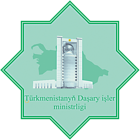Magtymguly Fragi»




On May 30-31 2017 within the framework of its Chairmanship at the International Energy Charter Conference, the Government of Turkmenistan jointly with the Secretariat of the International Energy Charter held Ashgabat International Energy Charter Forum “Towards a Multilateral Framework Agreement on Transit of Energy Resources.” More than 80 participants, including Ministers, high-level officials and leading experts from member-states and observers of the International Energy Charter, international energy and financial organizations, energy companies and research institutions, attended the Forum.
The subsidiary bodies of the Energy Charter Conference (chaired by Turkmenistan this year) are currently working towards developing the conditions for starting negotiations on a Multilateral Framework Agreement on Transit of Energy Resources. In particular, the main task this year is to identify specific issues and challenges relating to transit and to develop possible alternative solutions reflecting the needs of the Energy Charter’s member countries.
This Forum, like the previous meetings of experts on reliable and stable energy transit held in Ashgabat (December 2014), Brussels (April 2015), Beijing (November 2015), and Tirana (July 2016) allowed discussions on the issues of transportation and transit in a broad geographical context, and took into account the positions of different countries, both producers and consumers, and transit countries.
During the Forum, the issues of transit and cross-border transportation of energy resources, including natural gas, oil products and electricity, were discussed. The representatives of countries and international organisations noted the importance of international energy cooperation for achieving global energy security and implementing the Sustainable Development Goals. It was also pointed out that the transit of energy resources, which necessarily includes the issues of transportation and conditions for infrastructure access, is one of the most important elements of the entire interconnected chain of energy supplies to international markets.
The Forum had separate sessions addressing the issues of trade, transportation and transit of natural and liquefied gas, oil and electricity. These sessions highlighted the complexity of ensuring the security of energy transit, and emphasized the need for clear and consistent principles of multilateral cooperation among the participants, as it is often observed that different players tend to pursue their own particular interests. Energy-importing countries depend on foreign resources for proper functioning of their national economies. Hence, they are highly interested in the continuity of energy products flows to their borders. On the other hand, energy-exporting countries and their enterprises place great emphasis on the issue of market stability, as foreign trade is vital source of their income. Ultimately, all countries are interested in minimizing transit risks to ensure their own security.
The importance of transit in the context of global energy security has already been addressed in the UN General Assembly Resolution 67/263 “Reliable and stable transit of energy and its role in ensuring sustainable development and international cooperation” developed at the initiative of Turkmenistan and adopted by consensus on May 17, 2013. However, there remains the need to develop multilateral legal instruments providing uniform principles and rules and regulating the relations among energy producers, consumers and transit countries. The current work within the Energy Charter Process under the Chairmanship of Turkmenistan on the development of a Multilateral Framework Agreement on the Transit of Energy Resources is one of the possible instruments for developing international trade in energy resources.
The participants of the Forum noted that there are issues related to the practical feasibility of investments, non-discriminatory access to the infrastructure, and general pricing principles using existing infrastructure. The creation of an international legally binding transit regime for cross-border transportation of natural gas, electricity and oil is a complex task. It was emphasized that the development of a single legally binding instrument on transit depends on the political will of the International Energy Charter member countries.
For its part, the Government of Turkmenistan will submit a report to the UN General Assembly on the work in the field of energy transit accomplished jointly with the International Energy Charter in pursuance of the UN General Assembly Resolution 67/263. Moreover, Turkmenistan as the chair of the Energy Charter Conference in 2017 calls on the co-sponsors of this Resolution to join the Energy Charter Process by signing a political declaration - the International Energy Charter – with a view to fully participate in the development of uniform energy transit principles and rules.
As of today, the Energy Charter Treaty is a unique legally binding instrument regulating the issues of energy transit, as reflected in the report of the UN Secretary-General “On Reliable and Stable Energy Transit and Its Role in Ensuring Sustainable Development and International Cooperation”, published in 2014. Signing the International Energy Charter that currently unites over 80 countries worldwide is the first step towards acceding to the Treaty, which aims to strengthen legal norms in the energy sector by applying uniform rules binding for all participants and minimizing the risks associated with investment and energy trade.
The geographical expansion of the Energy Charter vector in a rapidly changing energy landscape will allow the existing and new members to define the principles of global interaction in the energy sector, including the transit issues on the agenda. Therefore, we call for active participation of UN regional commissions, international energy and financial organisations, taking into account the accumulated experience, in the practical work on drafting a Multilateral Framework Agreement on Energy Transit, thus continuing the wide global dialogue initiated by the UN General Assembly Resolutions adopted in 2008 and 2013 on reliable and stable transit of energy resources.
Considering the leading role of the International Energy Charter in energy transit issues, we deem it expedient to hold such meetings on a regular basis in the regional context with a view to subsequently summarize the results of activities in this area.
The participants of the event highly appreciated the efforts of the Government of Turkmenistan and the International Energy Charter to promote a multilateral instrument on energy transit with a view to achieve a balance of interests of exporting countries, consumers and transit countries, and expressed gratitude to the Government and the President of Turkmenistan Gurbanguly Berdimuhamedov personally for the support provided for Ashgabat International Energy Charter Forum. In addition, it was noted that the participants hope that these conclusions will be taken into account and reflected in the political declaration to be adopted on the results of the 28th session of the Energy Charter Conference in Ashgabat on November 28-29 of the current year.

